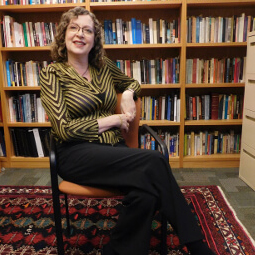Professor Inhorn is the William K. Lanman Jr. Professor of Anthropology and International Affairs and Chair of the Council on Middle East Studies (CMES) in the MacMillan Center for International and Area Studies. As Past-President of the Society for Medical Anthropology (SMA) of the American Anthropological Association, Inhorn hosted the first international SMA conference on “Medical Anthropology at the Intersections: Celebrating 50 Years of Interdisciplinarity,” which was held at Yale University. She has also received the SMA’s Medical Anthropology Student Association (MASA) Graduate Student Mentor Award.
Inhorn’s research interests revolve around gender and health, science and technology studies (STS), feminist theory (including masculinity studies), religion and bioethics, globalization and global health, cultures of biomedicine and ethnomedicine, stigma and human suffering, and the health costs of conflict, especially for refugees and forced migrants.
Inhorn has undertaken in-depth ethnographic research in three Middle Eastern countries, as well as in Arab America. She is the author of six books on the subject, including America’s Arab Refugees: Vulnerability and Health on the Margins (Stanford U Press, 2018); Cosmopolitan Conceptions: IVF Sojourns in Global Dubai, (Duke U Press, 2015); The New Arab Man: Emergent Masculinities, Technologies, and Islam in the Middle East (Princeton U Press, 2012), Local Babies, Global Science: Gender, Religion, and In Vitro Fertilization in Egypt (Routledge, 2003); Infertility and Patriarchy: The Cultural Politics of Gender and Family Life in Egypt (U Pennsylvania Press, 1996) and Quest for Conception: Gender, Infertility, and Egyptian Medical Traditions (U Pennsylvania Press, 1994). The books have won multiple awards, including the American Anthropological Association’s Robert B. Textor and Family Prize for Excellence in Anticipatory Anthropology, the Eileen Basker Prize of the Society for Medical Anthropology, and the Diana Forsythe Prize for outstanding feminist anthropological research in the areas of gender, health, science, technology, and biomedicine.
Inhorn is also the primary editor or co-editor of ten volumes, including Reconceiving Muslim Men: Love and Marriage, Family and Care in Precarious Times (Berghahn Books, 2018); Globalized Fatherhood (Berghahn Books, 2014); Medical Anthropology at the Intersections: Histories, Activisms, and Futures (Duke U Press, 2012); Islam and Assisted Reproductive Technologies: Sunni and Shia Perspectives (Berghahn Books, 2012); Anthropology and Public Health: Bridging Differences in Culture and Society (Oxford U Press, 2009); Reconceiving the Second Sex: Men, Masculinity, and Reproduction (Berghahn Books, 2009); Reproductive Disruptions: Gender, Technology, and Biopolitics in the New Millennium (Berghahn Books, 2007); and Infertility around the Globe: New Thinking on Childlessness, Gender, and Reproductive Technologies (U California Press, 2002).
As a Middle Eastern scholar focusing on infertility and assisted reproductive technologies, Inhorn has been a visiting professor at the American University of Beirut, Lebanon, and the American University of Sharjah, United Arab Emirates. With research support from Fulbright-Hays and the National Science Foundation, she has conducted multiple ethnographic research projects in Egypt, Lebanon, and the United Arab Emirates. Her most recent National Science Foundation study focuses on “The Egg Freezing Revolution? Gender, Technology, and Oocyte Cryopreservation in the U.S. and Middle East.” From 2018-2021, she is co-leading a Wellcome Trust research project on “Changing (In)Fertilities” with Prof. Sarah Franklin of the University of Cambridge.
Inhorn is the founding editor of JMEWS (Journal of Middle East Women’s Studies), the professional journal of the Association of Middle East Women’s Studies (Middle East Studies Association); co-editor-in-chief of Reproductive BioMedicine and Society; associate editor of Global Public Health; and co-editor for the Berghahn Book series on “Fertility, Sexuality, and Reproduction.”
Inhorn comes to Yale from the University of Michigan (2001-2008). She has also taught at Emory University (1994-2000) and the University of Arizona (1991-1994). She is the wife of Kirk Hooks and mother of Carl (25) and Justine Hooks (22). Inhorn is also a cellist.
